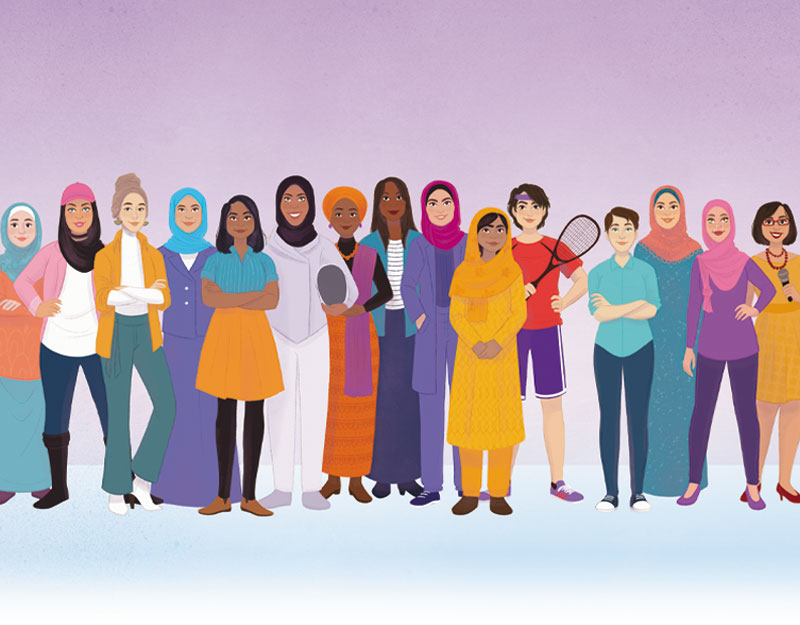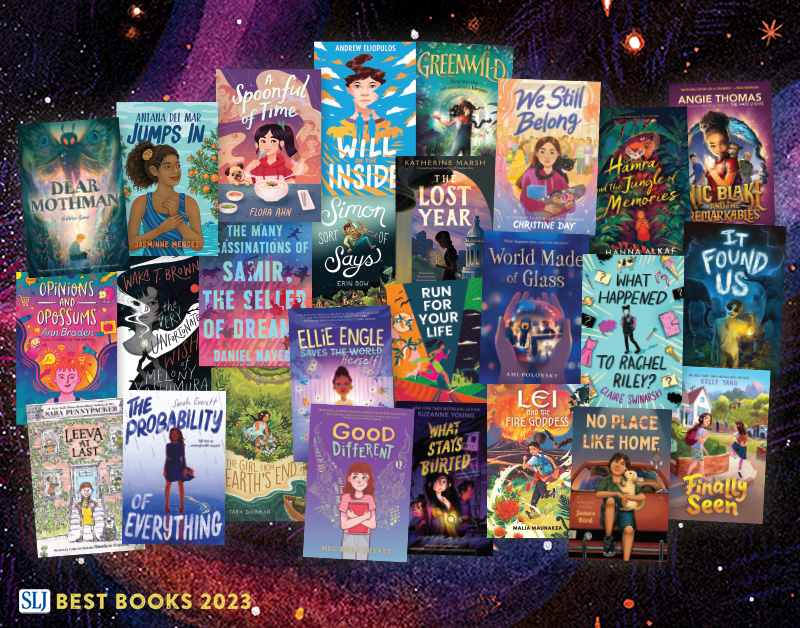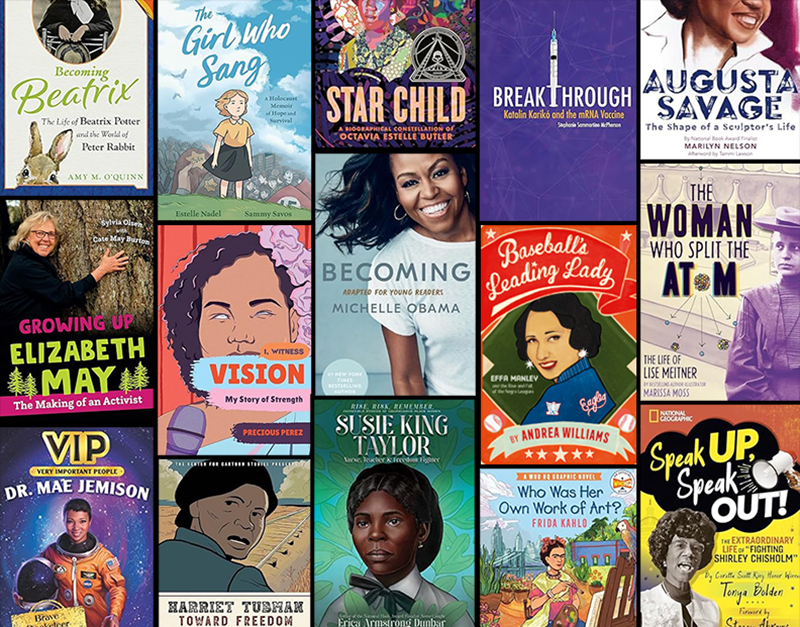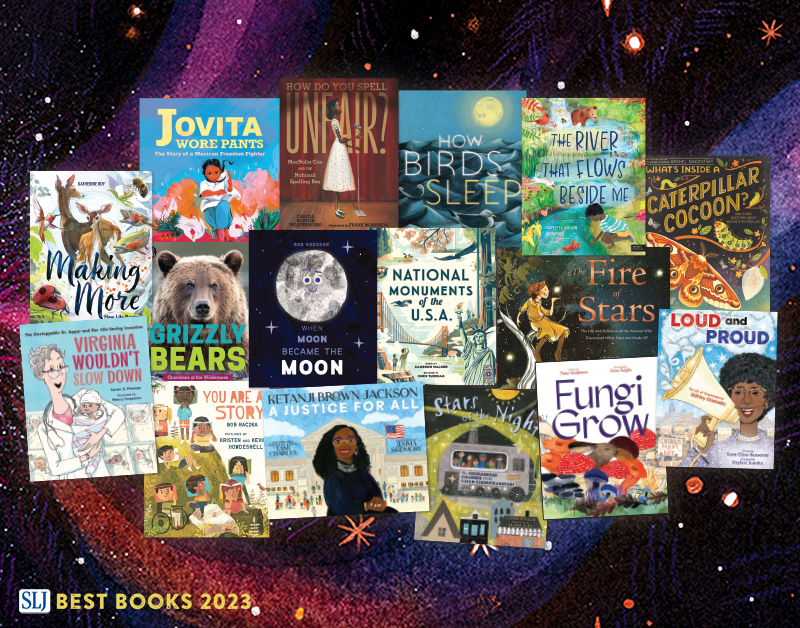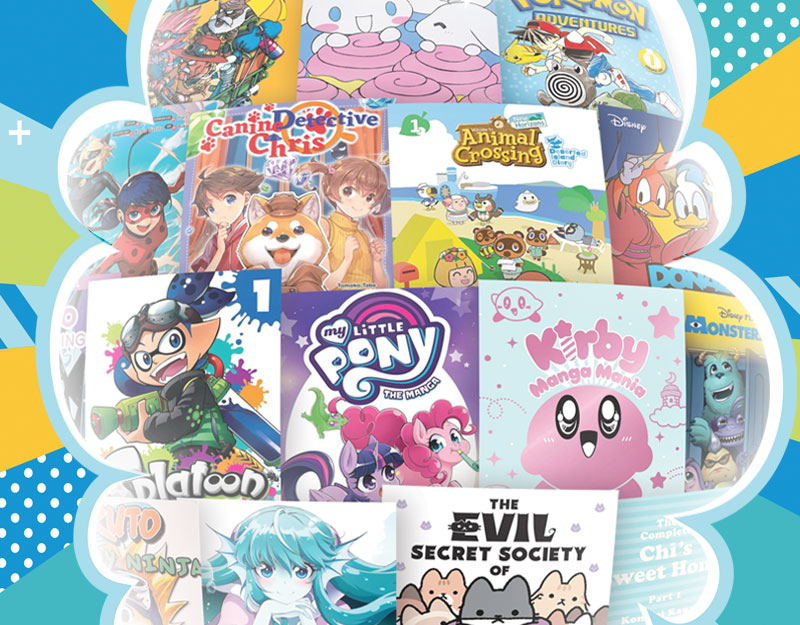Multidimensional Masculinity and Resuscitating “Literacy Life” in Kids: We’re Talking With Torrey Maldonado Today!
It wasn’t all that long ago that all the talk on the children’s literature social media was about middle grade novels and their prodigious length. Where, the people asked, were the Apple paperback-length books from the days of yore? Where the Goosebumps-sized novels? The conversation on this topic has since shifted (either to AI, once again, or why there are too many grandmother picture books) but let’s just pause for a moment and consider the original complaint. Middle grade is too long, you say? Then surely you are not reading the tight, one might even say handsome, books of one Mr. Torrey Maldonado. Having been a fan of Torrey’s for years and years, I was delighted to read his latest release Hands. Yet is there sufficient coverage of this book? Are there enough people discussing it? Recommending it?
There. Are. Not.
Today we are attempting to right this great wrong, and have a talk with Torrey about his latest. And best of all, he was good enough to join in!
But first! Here’s a plot synopsis of the book so that you don’t have to play catch-up with our talk:
“It’s always been about Trev’s hands. When he was younger it was all about using them for drawing. Trev’s a talented artist, and he might even have a future in it. But when Trev got older, he started using his hands for something else. That was when his stepfather lay HIS hands on Trev’s mom and went to jail for it. He swore he’d be back, and Trev’s lived in terror of that happening ever since. Seems like the only way to protect his mom, sister, and step-sister would be to learn how to fight. Now he’s doing exactly that, but not everyone’s on board. There’s a whole crew of men in the neighborhood that have set themselves up as Trev’s uncles, and they are not about to let him throw everything away because of what he fears. They’re gonna be here, instead, to show him the way.”
Talk time!
Betsy Bird: Torrey! So good to be talking to you again! Heck, it’s so good to see another book of yours coming out. It’s always a thrill to see what you have in store for us and HANDS is the kind of book that sort of grabs you from the first page and doesn’t let you go. Can you tell us a bit about where this book came from?
ADVERTISEMENT
ADVERTISEMENT

Torrey Maldonado: Thanks, Betsy. Many reviews say my books are so authentic and personal that no other can write them. That’s especially true with Hands because it’s as specific to me as my fingerprint and why an aunt said, “Reading Hands felt like reading your diary or journal”. Why? No one else had my Mom (who’s the mom in Hands) and our mom-son bond that I detail. No other published author I know survived what I did and that’s Trev’s dilemma. No writers I know grew up in the tough Brooklyn projects where I did with the village I had that’s the setting and community of Hands. When Ma keeps urging Trev to live Maya Angelou’s quote and “Be a rainbow in someone else’s cloud” that’s what my Mom urged me to do. Trev feeling “east and west” about whether to use his hands to draw or to fight to protect his mom and sisters was how I felt torn. Hands raises questions that burned in me as I journeyed Trev’s road alone that turns out to be questions asked by billions around our globe: Does everyone have a village? How do we know we have one? How can we spot real helpers? What path is right? Hands is so personal that I breathed a therapeutic sigh when I finished it. I exhaled another whew of relief when my doubtful wondering, “Will others connect to Hands when it’s so specific to me?” was met with such a global embrace that even Pernille Ripp in Europe with the Global Read Aloud contacted me to say it should be a GRA contender and reviewed it saying, “I have loved the work of Torrey Maldonado since I was first given Tight several years ago. Hands is his best one yet. It is one of the best books I have read, and I don’t say that lightly as I read a lot of books. This needs to be translated into Danish for all the kids that need it here too”. To give readers a sense of where my books come from, I’ve paired them with Hamilton musical songs so I wonder what readers will say about Hands’ spirit. Is it “History Has Its Eyes on You” or “Ten Duel Commandments”?
BB: So one thing I’ve liked so much about your books is their length. I see these crushing 200 – 300-page tomes written for kids in late elementary/middle school and I’m a full grown 45-year-old woman but I don’t want to read them either! Then I see your books and not only do they have all the character development and nuance of those other books, they’re slim, tight, and incredibly readable. Has the size of your stories always been important to you? Is there any particular reason you tend to make them less than 200 pages?
TM: I love that you call them crushing “tomes” because it sounds like “tombs” that are connected to death and many 200-plus-page tome/tombs cause “literacy death”. It’s true because unnecessarily thick books almost killed me as a reader and as a writer. Most 200-plus-page books didn’t match the quickness of my world. Most 200-plus-page books don’t match the quickness of today’s young readers’ worlds. I’ve been teaching for over twenty-five years and each year I see kids stop loving literacy because they’re given thick books and they complain how you and I do—“I don’t want to read this”. So kids don’t or do, but hate it, then associate literacy with something to hate. The weight and slowness of many thick books crushes the life out of us. Not all 200-page-plus books are boring and slow, but lots are. No one quits what’s fun. Are experts trying to tell us that a young person getting fast-paced, excellent storytelling from TV, movies, and thin comics will quit THAT fun to read a 200-plus-page tome/tomb? We know that’s not happening and it’s a failing model. That same literacy approach of asking kids to read tomes is what I experienced my whole life as a student and it’s what I saw during my educator-tenure and that approach failed boy-me, failed my peers, generations of our families, and young readers today. Where I’m from, the high school dropout rate is nearly seventy percent. I’m the only sibling to graduate high school. And that’s linked to supplying kids with tomes that help cause “literacy death”. I’ve asked one question my whole life: Aren’t schools supposed to be weapons of mass instruction and not weapons of mass destruction of ‘lifelong love of literacy’? So my solution is I offer what’s different that made a difference for me: thin books that offer what the best thick books do. Educators, families, and kids love my approach because kids see Hands and exclaim, “Only a 125-pages? I CAN read this”, then do, then they ask for my other books that are all under 177 pages. It means my books are thin breaths of fresh “literacy-air” to resuscitate “literacy life” in kids and to help them maintain a lifelong love of literacy.
BB: Beautiful. So along those same lines I see your books and not only do they have all the character development and nuance of those other books, they’re slim, tight, and incredibly readable. Can we talk a bit more about the size of your stories? Has it always been important to you?
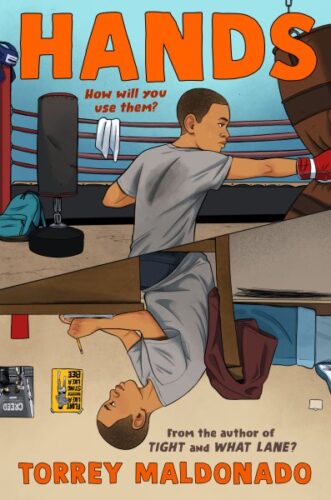
TM: You might be like me and sometimes overthink. When overthinking roadblocked me as a boy as I wrote, my mom reminded me to K.I.S.S. and it’s why I joke in my writing workshops and to my public school classes, “I’ll to teach you to K.I.S.S.”. Kids react with, “Ewww!” and “What?!!!”. My mom meant, “K.eep I.t S.hort and S.weet”. That advice helps and helped. The shapers of my creative origins were street storytellers (griots), rappers, singers, comics, shows, and movies and they K.I.S.S. and their effect on me attracted me to the Rap being made in my environment, short stories, then poems and short essays. We’re at the 50th birthday of Hip Hop so fun fact—the rapper Biz Markie who sang, “Oh baby you, you got what I need” dated my sister and I have other family who were involved in Hip Hop’s birth and growth so that storytelling-style is in my personal DNA. Also, my first published works were poems in a nationally published urban-authentic magazine. So I “K.I.S.S.” because I make “slim, tight, easy listening” writing. Adam Gidwitz—Newbery Honor-winning author— acknowledges that when he blurbs, “Hands is a compact, fast-paced novel narrated in a poetic style”. My books are novels as well as narrative poems without an intimidating and unrelatable poetic structure. My books aim to speak how the best Raps, songs, and moving-image media do.
BB: I’m still hung up on the fact that Biz Markie dated your sister! Okay, let’s talk “how” now. HOW do you write something thin but “thick with complexity” (a phrase you use so beautifully in the Acknowledgments at the back of HANDS)? What’s your process? Do you write more than you need and then cut down? Do you always have an exact size in mind and stick to it? What do you do to get here?
TM: I have a story to share, a type of reader to share it with, and I share it so that reader wants more of what I have to say. That’s how it is to live in the Red Hook projects in Brooklyn, New York City. Life magazine called my hometown “One of the Ten Worst U.S. Neighborhoods” which tells you drama was everywhere outside my apartment and often in it. To steer me right, my mom taught me, “Everyone is not for you” and “You’re not for everyone” and that’s my approach to writing because my books are not for everyone and, while they’re praised as universal and timeless, I write for you if you don’t have time for all the things, don’t have money to buy all the things, if you want what you haven’t seen or heard or lived before. Where I’m from, I didn’t expect to live past my teen years. In many urban areas, people feel that sense of immediacy because tomorrow isn’t promised. So I also write for readers who don’t feel they have infinite tomorrows to finish a book and want to start and finish one today. That immediacy is in my writing—my New York fiction wraps up as quick as “a New York minute”.
BB: Trev’s story comes down to whether or not he uses his boxing talents today, even if they might squash his dreams tomorrow. He feels like he doesn’t have a choice in the matter. I’m always interested in main characters and whether they do or do not have a choice in their storyline. How, when you’re writing this book, do you make sure that Trev’s not a bystander or a passive character?
TM: I make Trev and my other main characters active because people everyone want to feel agency and choices are in our hands. Fans of Hands love the Star Wars scenes and other parts where characters take action to use hands to knock down or build up. It matters that Trev is where I’m from and active because in poorer communities our hunger for agency, choice, freedom, and power is amplified. I teach in the middle school I graduated from and once joked, “Our classroom’s broken heat reminds me of being a kid in the projects” and a girl from my projects replied, “For real. The heat be broken in Summer and be hotter inside than outside” and I bantered, “And heat be off in the Winter so our apartments be colder than a snowstorm. How’d you feel when that happened?” She wanted to take action how Trev speaks to injustices in Hands, and said, “I want to go to the housing office and. . .” Our impoverished conditions of broken heat, incinerator chutes overflowing with trash because housing workers poorly clean, building lobby-doors that stay broken and don’t lock out threats are documented in Hands and my other books. Add family dynamics that I explore that mirror my and readers’ lives are reminders that we could feel we have no choices. Compound to that the history of both sides of my family. The African-American side has a history of our enslavement for four hundred-years. My Puerto Rican side also has a history of enslavement whose length and conditions parallel U.S. slavery. It all equals to lots of generations feeling stripped of choices. I want my readers to feel different. I want my readers to see we have agency, can choose, act, and flip hard times into more manageable times. I visit schools and White and BIPOC kids tell me they appreciate my writing for that. Type into YouTube “E Train Hands Torrey Maldonado” for more on that. That’s why Trev is not a bystander—he takes matters into his own hands. School counselors, psychologists, educators, and families tell me they see young people mirroring him to (in the words of Bob Marley) “stand up for what’s right”.
BB: A big theme of the book is masculinity and how the perception of it influences a lot of our young men. Can you talk about that?
ADVERTISEMENT
ADVERTISEMENT
TM: Masculinity is a big theme of Hands because masculinity influences everyone. Folks sometimes act like we aren’t in the same social pool and that waves made by boys or men don’t ripple and affect girls, women, adults, and everyone. Just look at the “Butterfly Effect” in our nation. What’s happening with masculinity with White males across our nation with all-male White groups growing in numbers and showing up to use their hands in marches? Does their toxic masculinity just affect men? What’s happening with toxic masculinity in the Black and Brown communities where we see males using hands to settle daily conflicts? Does that affect just those men? Or are friends, families, and others affected? What’s happening with young people today is what’s been happening for as long as we can remember when young minds receive a steady stream of toxic messages about masculinity. Hands and my other books quietly yet powerfully questions and explores toxic masculinity. The conversations and answers about how boys act and the possibilities of masculinity that educators tell me they have with upper elementary student, middle, and high schoolers is moving.
BB: And do you feel the conversation about masculinity has changed much since you started teaching twenty-five or so years ago? What can HANDS do to steer those discussions?
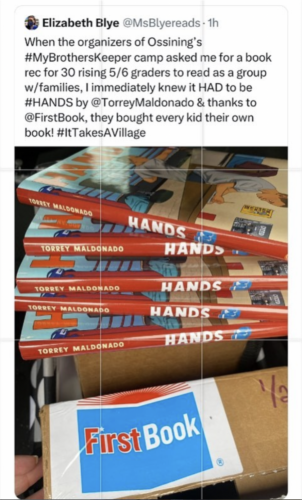
TM: Since I started teaching over twenty-five years ago, the conversation about masculinity has changed a lot and educators say my books have influenced that. Penguin has an amazing Discussion Guide for Hands that’s on my website that educators across our nation say it is invaluable in steering conversations about toxic masculinity. Shoutout to Dr. Shanetia Clark at Salisbury University for that guide. If folks go to Twitter and Instagram, they’ll see how educators use Hands in a myriad of ways to help young readers explore what is it to be a man, what makes a man, how class and race affects masculinity, and more. Studies show that Black young boys are treated differently, and Hands shows that and goes into how Black boys aren’t given the space to be a whole boy and aren’t given the space to grow into whole or wholesome men. Hands helps boys have a more multidimensional masculinity and I’ve a lot of examples to illustrate that, yet I’ll share one for now. An Evanston middle school librarian named Lori Martin sent me a video of her boys sharing how much they appreciate Hands. These are the type of boys who wouldn’t say “I love you” to other males but at the end of their recording they say, “Thanks for writing Hands. Torrey, we lo—” then catch themselves. Both the librarian and I noticed they almost said “I love you” and were showing another dimension of their masculinity and our hearts swelled. I’m grateful Hands is a tool to help build multidimensional masculinity.
BB: Finally, what are you working on for us next?
TM: In June 2023, a groundbreaking anthology edited by two Latinas—Ismée Williams, Rebecca Balcárcel—called Boundless published and I’m in it with your favorite award-winning and bestselling authors with our stories that celebrates multiracial and/or multicultural identities. It’s perfect reading for fans of COME ON IN and BLACK ENOUGH. Looking to January 2024, I’m in another anthology curated by the #1 New York Times bestselling author of This Book Is Anti-Racist—Tiffany Jewell. It’s a YA nonfiction compilation of all-star creatives highlighting inequities Black and Brown students face from preschool through college and is receiving advanced reviews as one of the most important, empowering reads of the year. In February 2024, I’m in another anthology curated by another Latina—Sandra Proudman—called RELIT. It has award-winning and bestselling YA authors centering Latinx points of view in our remixes and reimaginings of classics through fantasy, science fiction, and magic. In RELIT characters fall in love, battle odds and enemies, and grow through grief, and each story empowers readers to see themselves as the heroes of our world. Nancy Paulsen and Penguin Kids and I have picture books on the horizon with my first picture book publishing in 2025. Then every year after, a new picture book of mine will publish for a few years. I also am working on more middle grade books that has what excites readers about my other books.
Thank you, Torrey! Love watching you wield those words. And for those of you out there curious about him, let me just tell you that Torrey Maldonado was born and raised in Brooklyn’s Red Hook projects. He has taught in New York City public schools for over 25 years and his popular young readers novels include What Lane?, which won many starred reviews and was cited by Oprah Daily and the NY Times for being essential to discuss racism and allyship; Tight won the Christopher Award, was an ALA Notable Book, and an NPR and Washington Post Best Book of the Year; and his first novel, Secret Saturdays, has stayed in print for over ten years. This newest book, Hands is a Junior Library Guild Gold Standard Selection, won a starred School Library Journal review and amazing reviews from Horn Book, Kirkus, and Publishers Weekly, and is a “Best New Book of 2023”. Learn more at torreymaldonado.com or connect on social media @torreymaldonado.
Filed under: Best Books, Best Books of 2023, Interviews
About Betsy Bird
Betsy Bird is currently the Collection Development Manager of the Evanston Public Library system and a former Materials Specialist for New York Public Library. She has served on Newbery, written for Horn Book, and has done other lovely little things that she'd love to tell you about but that she's sure you'd find more interesting to hear of in person. Her opinions are her own and do not reflect those of EPL, SLJ, or any of the other acronyms you might be able to name. Follow her on Twitter: @fuseeight.
ADVERTISEMENT
ADVERTISEMENT
SLJ Blog Network
Endangered Series #30: Nancy Drew
Cat Out of Water | Review
Navigating the High School and Academic Library Policy Landscape Around Dual Enrollment Students
MakerSpace: Dipping My Toes into Sublimation 101
ADVERTISEMENT



